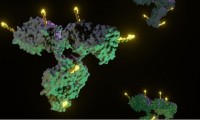-
BioNTech, DualityBio Move ADC into Phase III for HER2-Low Breast Cancer
- Source: drugdu
- 108
- September 5, 2023
-
Healthy Breast Fat may Protect Against Invasive Breast Cancer
- Source: drugdu
- 104
- July 18, 2023
-
Dana-Farber research supports FDA approval of new therapy for metastatic breast cancer
- Source: drugdu
- 150
- June 6, 2023
-
Research finds alternating estrogen and anti-estrogen therapies effective in treating metastatic breast cancer
- Source: drugdu
- 125
- May 17, 2023
-
Dietary supplement helps combat resistance in breast cancer, finds study
- Source: drugdu
- 140
- April 12, 2023
-
All hormonal contraceptives ‘carry small increased risk of breast cancer’
- Source: drugdu
- 121
- March 22, 2023
-
Novartis’s Alpelisib Treats Advanced Breast Cancer
- Source: Reuters
- 890
- August 24, 2018
-
Night Shifts could Potentially Increases the Risk of Breast Cancer
- Source: MedicalNewsBulletin
- 789
- July 2, 2018
-
Canadian Scientists Find Blocking Certain Proteins can Avert Breast Cancer
- Source: MedPageToday
- 827
- June 21, 2018
-
Blood Test to Predict Drug Activity Against Breast Cancer
- Source: Ddu
- 886
- June 7, 2018
your submission has already been received.
OK
Subscribe
Please enter a valid Email address!
Submit
The most relevant industry news & insight will be sent to you every two weeks.













